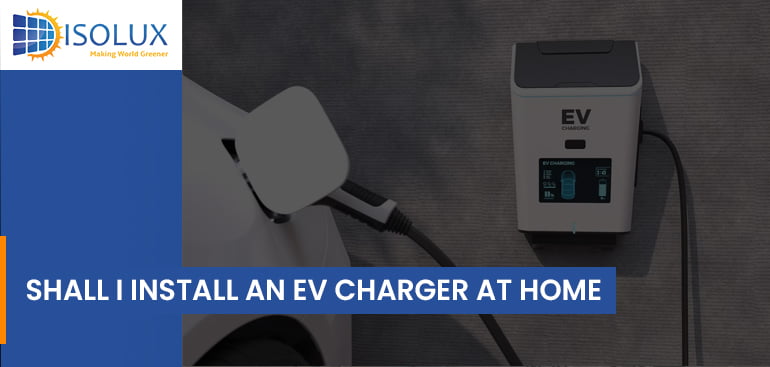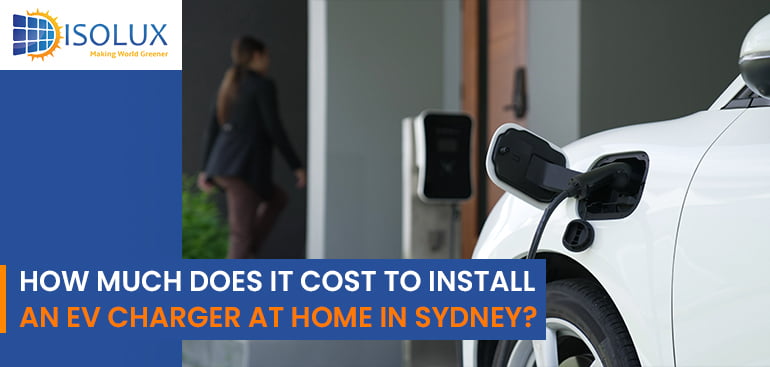As electric vehicles (EVs) become increasingly popular, many drivers are opting to install EV chargers at home. Not only is it convenient, but it can also save time and money in the long run. In this blog, we will discuss installing an EV charger at home and the different types of chargers available.
Choosing the Right EV Charger
The first step in installing an EV charger at home is choosing the right one for your needs. There are several types of chargers available, including Level 1, Level 2, and DC fast chargers.
Level 1 chargers are the slowest and most basic type, as they use a standard 120-volt outlet and can take up to 24 hours to fully charge an EV. Level 2 chargers, on the other hand, use a 240-volt outlet and can fully charge an EV in 4-8 hours, depending on the battery size. Finally, DC fast chargers are the fastest type, but they are also the most expensive and typically require professional installation.
Level 2 charger is the best option for most homeowners. They are faster than Level 1 chargers and more affordable than DC fast chargers. However, it is important to check your EV’s charging requirements before making a purchase.
Types of EV Chargers
There are three main types of EV chargers for home use: Level 1, Level 2, and DC fast chargers. Let’s take a closer look at each of these options:
Level 1 Chargers
Level 1 chargers are the slowest type of EV charger, providing about 2-5 miles of range per hour of charging time. They typically use a standard 120-volt household outlet and are the easiest and cheapest option for EV owners who do not drive long distances every day.
Level 2 Chargers
Level 2 chargers are faster and more powerful than Level 1 chargers, providing about 10-20 miles of range per hour of charging time. They require a 240-volt circuit and a dedicated charging station, which can be installed either indoors or outdoors. Level 2 chargers are ideal for EV owners who drive long distances every day or have larger battery packs that require more charging time.
DC Fast Chargers
DC fast chargers are the fastest and most powerful type of EV charger, providing up to 60 miles of range in just 10 minutes of charging time. They use a 480-volt circuit and are typically only available at public charging stations, although some EV owners may choose to install them at home. DC fast chargers are ideal for EV owners who frequently drive long distances and need to charge their vehicles quickly.
Preparing for Installation
Once you have chosen the right EV charger for your needs, the next step is to prepare for installation. This typically involves hiring a licensed electrician to install a 240-volt outlet in your garage or driveway. This is a crucial step, as EV chargers require a dedicated circuit to prevent overloading the electrical system in your home.
It is also important to choose a location for the EV charger that is easily accessible and protected from the elements. Most homeowners opt to install their EV chargers in their garages, but it is also possible to install them outdoors with the proper equipment and protection.
Installation Process
Once the 240-volt outlet has been installed, the actual installation of the EV charger can begin. This typically involves mounting the charger on the wall or a pole, connecting the wiring to the 240-volt outlet, and configuring the charger settings.
It is important to follow the manufacturer’s instructions carefully during the installation process to ensure that the charger is installed correctly and safely. If you are not comfortable with DIY installation, it is recommended to hire a licensed electrician or professional installer.
Maintenance and Safety
Once your EV charger is installed, it is important to keep up with regular maintenance to ensure that it continues to function properly. This includes checking the wiring and connections periodically, as well as ensuring that the charger is protected from the elements and any potential damage.
It is also important to follow basic safety guidelines when using your EV charger. Always make sure to unplug the charger before touching any of the components, and never attempt to repair or modify the charger yourself. If you notice any issues or problems with your EV charger, it is best to contact a professional for assistance.
Benefits of Installing an EV Charger at Home
Convenience
One of the main advantages of having an EV charger at home is the convenience it offers. Instead of having to make a special trip to a public charging station, you can charge your EV right in your garage or driveway. This is especially useful for people who have a busy schedule or don’t have easy access to public charging stations.
Cost Savings
Charging Electic Vehicle at home will save you money in the long run. Public charging stations often charge more per kilowatt-hour (kWh) than it costs to charge at home. Additionally, some utility companies offer special rates for EV owners who charge their vehicles during off-peak hours, which can further reduce your energy costs.
Increased Home Value
EV chargers increase the value of your property. As EVs become more popular, having a charging station already installed can be a selling point for potential buyers.
EV Charger Safety Tips
Charging your EV at home is generally safe, but there are a few important safety tips to keep in mind:
Follow manufacturer instructions: Always follow the manufacturer’s instructions for your EV and charger.
Use a dedicated circuit: Plug your charger into a dedicated circuit to avoid overloading your electrical system.
Use a certified electrician: Hire a licensed electrician to install your charger and ensure that all safety codes and regulations are followed.
Conclusion
Installing an EV charger at home can be a great investment for EV owners, providing convenience and cost savings in the long run. By following the steps outlined in this blog, you can ensure that your EV charger is installed correctly and safely and that you can enjoy all the benefits of electric vehicle ownership.
Get an obligation free quote from Isolux solar.
Read Next Blog:



